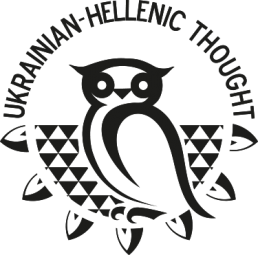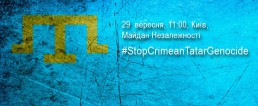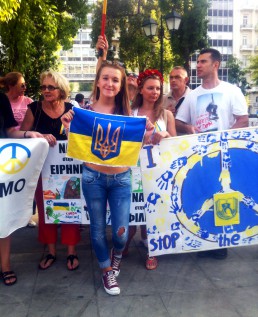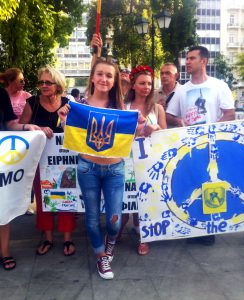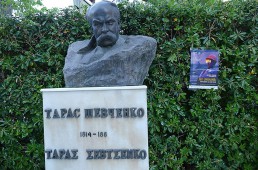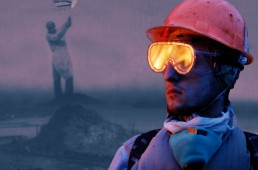#StopCrimeanTatarGenocide (En)
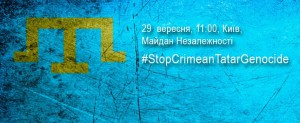 Appeal of Crimean Tatars, representatives of human rights monitoring organizations, Ukrainian and international civil society groups, Members of Parliament of Ukraine, politicians in regard to the prospect of banning of the Mejlis of the Crimean Tatar people
This is a letter of alarm and a call for awakening. Crimean Tatars, the indigenous people of Crimean peninsula and a nation that has been once put on a brink of extinction, are subject to lawless repression by an authoritarian oppressor again. Since the illegal annexation of Crimea by the Russian Federation in 2014, which the absolute majority of Crimean Tatars strongly rejected, the scale of oppression of this nation has only been growing. The political inconvenience that the Crimean Tatars presented for Kremlin was coupled with the historical sentiment of hate that was once aggravated to a point when the entire nation was deported to Central Asia in 1944. The chilling déjà vu started with disallowing the political leaders of the nation Mustafa Dzhemilev and Refat Chubarov to enter the peninsula in the immediate aftermath of the occupation. Then followed the first kidnappings and arrests of Crimean Tatars under falsified pretexts. Simultaneously Crimean Tatars were targeted by the security forces of the Russian Federation based on their religious views. Currently 17 Crimean Tatars are behind the bars for various falsified accusations. Political dissent has been harshly suppressed since the very beginning of the occupation. In spring of 2016 the Deputy Head of the Crimean Tatar Mejlis Mr. Ilmi Umerov became a subject to a politically motivated prosecution by the Russian state, was forcibly taken from the cardiac unit where he was under observation to Psychiatric Hospital No. 1 in Simferopol. The act of punitive psychiatry against Ilmi Umerov that lasted for 21 days clearly disregarded the European Convention for the Prevention of Torture and Inhuman or Degrading Treatment or Punishment. Mr. Umerov is a second Deputy Head of the Crimean Tatar Mejlis to be persecuted by the Russian state with Mr. Akhtem Chiygoz was arrested in January, 2015.
February, the 15th 2016 marked a new stage of repression of Crimean Tatars. Crimean Tatar Mejlis, the executive body of the highest representative body of the Crimean Tatar People Qurultay was declared an extremist organization and illegal on the territory of Russia. A very telling fact is that the Ministry of Justice of Russian Federation included Mejlis in the list of banned organizations prior to the verdict of the court. If the verdict remains unchanged, 2500 democratically elected representatives of the Crimean Tatars will acquire a status of extremists and will become an automatic target of law-enforcement agencies. Furthermore, tens of thousands of people who contact and work with the members of Mejlis may also be repressed by the state machine. It would not be an overstatement to suggest that under such circumstances merely being a Crimean Tatar is illegal in the eyes of the occupying forces. In fact banning the Mejlis is banning the entire people. The repression machine may go out of control altogether given the fact that no permanent mission of any human rights organization is present in Crimea and there is not a single independent media outlet operating in the peninsula.
The decision has been appealed and the final decision on this case will be announced on September, 29th, 2016 in the Supreme Court of Russian Federation.
Hence we, the undersigned Crimean Tatars, representatives of human rights monitoring organizations, civil society groups, Members of Parliament of Ukraine, politicians call upon the global community to recognize the critical importance of this moment for the fate of the Crimean Tatar people. When an entire nation gets ripped of its democratically elected and the only political representation in 2016 the world shall not remain silent. The diplomatic and economic pressure on Russia must be elevated to a new level. The issue of repression of
Crimean Tatars has to be raised at meetings and negotiations of every profile and an immediate end to the repressions must be demanded from the Russian leadership. Concerted efforts of democratic countries have proven to have an influence on Kremlin in the past.
On September, 29th, the day of the hearing of the appeal in the Supreme Court of The Russian Federation, at 11 am (UTC +3) we will hold a demonstration at Independence Square in Kyiv, where we will demand an unconditional end of repressions against Crimean Tatars, display solidarity with the currently persecuted representatives of the nation and affirm the Russian leadership that together with the global community we will not allow another attempt of genocide of Crimean Tatar people.
We encourage regular citizens, civil activists, politicians, diplomats and opinion leaders to show unity with our struggle by coming to the Russian Embassy in countries across the globe and hold a simultaneous demonstration on September, 29th. We kindly ask to use hashtag #StopCrimeanTatarGenocide when covering the simultaneous demonstration in social media.
Appeal of Crimean Tatars, representatives of human rights monitoring organizations, Ukrainian and international civil society groups, Members of Parliament of Ukraine, politicians in regard to the prospect of banning of the Mejlis of the Crimean Tatar people
This is a letter of alarm and a call for awakening. Crimean Tatars, the indigenous people of Crimean peninsula and a nation that has been once put on a brink of extinction, are subject to lawless repression by an authoritarian oppressor again. Since the illegal annexation of Crimea by the Russian Federation in 2014, which the absolute majority of Crimean Tatars strongly rejected, the scale of oppression of this nation has only been growing. The political inconvenience that the Crimean Tatars presented for Kremlin was coupled with the historical sentiment of hate that was once aggravated to a point when the entire nation was deported to Central Asia in 1944. The chilling déjà vu started with disallowing the political leaders of the nation Mustafa Dzhemilev and Refat Chubarov to enter the peninsula in the immediate aftermath of the occupation. Then followed the first kidnappings and arrests of Crimean Tatars under falsified pretexts. Simultaneously Crimean Tatars were targeted by the security forces of the Russian Federation based on their religious views. Currently 17 Crimean Tatars are behind the bars for various falsified accusations. Political dissent has been harshly suppressed since the very beginning of the occupation. In spring of 2016 the Deputy Head of the Crimean Tatar Mejlis Mr. Ilmi Umerov became a subject to a politically motivated prosecution by the Russian state, was forcibly taken from the cardiac unit where he was under observation to Psychiatric Hospital No. 1 in Simferopol. The act of punitive psychiatry against Ilmi Umerov that lasted for 21 days clearly disregarded the European Convention for the Prevention of Torture and Inhuman or Degrading Treatment or Punishment. Mr. Umerov is a second Deputy Head of the Crimean Tatar Mejlis to be persecuted by the Russian state with Mr. Akhtem Chiygoz was arrested in January, 2015.
February, the 15th 2016 marked a new stage of repression of Crimean Tatars. Crimean Tatar Mejlis, the executive body of the highest representative body of the Crimean Tatar People Qurultay was declared an extremist organization and illegal on the territory of Russia. A very telling fact is that the Ministry of Justice of Russian Federation included Mejlis in the list of banned organizations prior to the verdict of the court. If the verdict remains unchanged, 2500 democratically elected representatives of the Crimean Tatars will acquire a status of extremists and will become an automatic target of law-enforcement agencies. Furthermore, tens of thousands of people who contact and work with the members of Mejlis may also be repressed by the state machine. It would not be an overstatement to suggest that under such circumstances merely being a Crimean Tatar is illegal in the eyes of the occupying forces. In fact banning the Mejlis is banning the entire people. The repression machine may go out of control altogether given the fact that no permanent mission of any human rights organization is present in Crimea and there is not a single independent media outlet operating in the peninsula.
The decision has been appealed and the final decision on this case will be announced on September, 29th, 2016 in the Supreme Court of Russian Federation.
Hence we, the undersigned Crimean Tatars, representatives of human rights monitoring organizations, civil society groups, Members of Parliament of Ukraine, politicians call upon the global community to recognize the critical importance of this moment for the fate of the Crimean Tatar people. When an entire nation gets ripped of its democratically elected and the only political representation in 2016 the world shall not remain silent. The diplomatic and economic pressure on Russia must be elevated to a new level. The issue of repression of
Crimean Tatars has to be raised at meetings and negotiations of every profile and an immediate end to the repressions must be demanded from the Russian leadership. Concerted efforts of democratic countries have proven to have an influence on Kremlin in the past.
On September, 29th, the day of the hearing of the appeal in the Supreme Court of The Russian Federation, at 11 am (UTC +3) we will hold a demonstration at Independence Square in Kyiv, where we will demand an unconditional end of repressions against Crimean Tatars, display solidarity with the currently persecuted representatives of the nation and affirm the Russian leadership that together with the global community we will not allow another attempt of genocide of Crimean Tatar people.
We encourage regular citizens, civil activists, politicians, diplomats and opinion leaders to show unity with our struggle by coming to the Russian Embassy in countries across the globe and hold a simultaneous demonstration on September, 29th. We kindly ask to use hashtag #StopCrimeanTatarGenocide when covering the simultaneous demonstration in social media.#StopCrimeanTatarGenocide (Ua)
 Звернення кримських татар, представників міжнародних та українських правозахисних організацій, представників громадянського суспільства, народних депутатів України та політиків до українських громад закордоном у зв’язку з перспективою заборони Меджлісу кримськотатарського народу на території Росії
Це звернення є сигналом тривоги та закликом до пробудження. Кримські татари, корінний народ Кримського півострова, народ, що колись вже опинявся на межі зникнення, знову став жертвою незаконних репресій з боку авторитарного режиму.
З часу незаконної анексії Криму Росією у 2014 році, яку однозначно не прийняла абсолютна більшість кримських татар, масштаб репресій проти цього народу невпинно зростав. Образ політичної перешкоди Кремлю був примножений історичним почуттям ненависті, яке в свій час призвело до депортації цілого народу до Середньої Азії у 1944 році. Моторошне дежавю тих подій розпочалось з заборони на в’їзд до півострова лідерам кримськотатарського народу Мустафі Джемілєву та Рефату Чубарову невдовзі після окупації. Згодом почалися зникнення та арешти кримських татар, що базувались на надуманих звинуваченнях. В той же час кримських татар почали переслідувати силові органи окупаційної влади на основі їх релігійних переконань. На сьогодні 17 кримських татар перебувають за ґратами. Навесні 2016 р. заступник голови Меджлісу пан Ільмі Умеров став об’єктом політично-упередженого кримінального переслідування з боку Російської держави та був силою переведений з кардіологічного відділу, де він проходив обстеження до психіатричної клініки №1 у місті Сімферополь. Використання каральної психіатрії проти Ільмі Умерова протягом 21 дня було явним порушенням Європейської Конвенції про запобігання катуванням чи нелюдському або такому, що принижує гідність, поводженню чи покаранню.
Пан Умеров є вже другим заступником голови Меджлісу, якого переслідує російська влада – першим у січні 2015 року став пан Ахтем Чийгоз.
15 лютого 2016 року став днем початку нового етапу репресій проти кримських татар. Окупаційна влада оголосила Меджліс кримськотатарського народу – виконавчий орган найвищого представницького органу кримських татар Курултаю – екстремістською організацією та заборонила його діяльність на території Росії. Показовим був той факт, що Міністерство Юстиції Росії внесло Меджліс до списку екстремістських (а отже заборонених) організації ще до вироку суду. В разі, якщо вердикт залишиться у силі, як мінімум 2500 демократично-обраних представників кримськотатарського народу отримають статус екстремістів та автоматично стануть об’єктом переслідувань з боку російських правоохоронних органів. Більше того, десятки тисяч людей, що співпрацюють чи комунікують з представниками Меджлісу також можуть бути репресованими. Не буде перебільшенням ствердити, що за таких умов бути кримським татарином – уже злочин в очах окупаційної влади. Фактично заборона Меджлісу є забороною цілого народу. Репресивна машина може узагалі вийти з-під контролю, враховуючи відсутність у Криму постійних моніторингових місій з прав людини чи незалежних ЗМІ. На рішення про заборону Меджлісу була подана апеляція і остаточне рішення у цій справі буде прийняте 29 вересня 2016 року у Верховному Суді Росії.
Тому ми – кримські татари, представники міжнародних та українських правозахисних організацій, представники громадянського суспільства, народні депутати України та політики закликаємо світову спільноту усвідомити виняткову важливість цього
моменту для долі кримськотатарського народу. Коли у цілої нації відбирають право на демократично-обране та єдине політичне представництво у 2016 році, світ не повинен мовчати. Дипломатичний та економічний тиск на Росію має вийти на новий рівень. Питання репресій проти кримських татар має порушуватись на зустрічах та переговорах усіх рівнів. Миттєве припинення репресій проти кримських татар має бути вимогою російському керівництву. Об’єднані зусилля демократичних держав вже неодноразово доводили свою впливовість у переговорах з керівництвом Росії.
29 вересня, у день розгляду апеляції у Верховному Суді Росії, об 11:00 ранку ми проводитемо демонстрацію на Майдані Незалежності в Києві. Під час демонстрації ми вимагатимемо невідкладного припинення репресій проти кримських татар, проявимо солідарність з тими кримськими татарами, що піддаються переслідуванню зараз та запевнимо керівництво Росії, що спільно з світовою спільнотою ми не допустимо повторення спроби геноциду кримськотатарського народу. Ми запрошуємо українців з усього світу проявити єдність у боротьбі та прийти до Російського Посольства у країнах їх проживання для проведення паралельної демонстрації 29 вересня 2016 року. При висвітленні синхронних акцій в соціальних мережах просимо використовувати хештег #StopCrimeanTatarGenocide
Звернення кримських татар, представників міжнародних та українських правозахисних організацій, представників громадянського суспільства, народних депутатів України та політиків до українських громад закордоном у зв’язку з перспективою заборони Меджлісу кримськотатарського народу на території Росії
Це звернення є сигналом тривоги та закликом до пробудження. Кримські татари, корінний народ Кримського півострова, народ, що колись вже опинявся на межі зникнення, знову став жертвою незаконних репресій з боку авторитарного режиму.
З часу незаконної анексії Криму Росією у 2014 році, яку однозначно не прийняла абсолютна більшість кримських татар, масштаб репресій проти цього народу невпинно зростав. Образ політичної перешкоди Кремлю був примножений історичним почуттям ненависті, яке в свій час призвело до депортації цілого народу до Середньої Азії у 1944 році. Моторошне дежавю тих подій розпочалось з заборони на в’їзд до півострова лідерам кримськотатарського народу Мустафі Джемілєву та Рефату Чубарову невдовзі після окупації. Згодом почалися зникнення та арешти кримських татар, що базувались на надуманих звинуваченнях. В той же час кримських татар почали переслідувати силові органи окупаційної влади на основі їх релігійних переконань. На сьогодні 17 кримських татар перебувають за ґратами. Навесні 2016 р. заступник голови Меджлісу пан Ільмі Умеров став об’єктом політично-упередженого кримінального переслідування з боку Російської держави та був силою переведений з кардіологічного відділу, де він проходив обстеження до психіатричної клініки №1 у місті Сімферополь. Використання каральної психіатрії проти Ільмі Умерова протягом 21 дня було явним порушенням Європейської Конвенції про запобігання катуванням чи нелюдському або такому, що принижує гідність, поводженню чи покаранню.
Пан Умеров є вже другим заступником голови Меджлісу, якого переслідує російська влада – першим у січні 2015 року став пан Ахтем Чийгоз.
15 лютого 2016 року став днем початку нового етапу репресій проти кримських татар. Окупаційна влада оголосила Меджліс кримськотатарського народу – виконавчий орган найвищого представницького органу кримських татар Курултаю – екстремістською організацією та заборонила його діяльність на території Росії. Показовим був той факт, що Міністерство Юстиції Росії внесло Меджліс до списку екстремістських (а отже заборонених) організації ще до вироку суду. В разі, якщо вердикт залишиться у силі, як мінімум 2500 демократично-обраних представників кримськотатарського народу отримають статус екстремістів та автоматично стануть об’єктом переслідувань з боку російських правоохоронних органів. Більше того, десятки тисяч людей, що співпрацюють чи комунікують з представниками Меджлісу також можуть бути репресованими. Не буде перебільшенням ствердити, що за таких умов бути кримським татарином – уже злочин в очах окупаційної влади. Фактично заборона Меджлісу є забороною цілого народу. Репресивна машина може узагалі вийти з-під контролю, враховуючи відсутність у Криму постійних моніторингових місій з прав людини чи незалежних ЗМІ. На рішення про заборону Меджлісу була подана апеляція і остаточне рішення у цій справі буде прийняте 29 вересня 2016 року у Верховному Суді Росії.
Тому ми – кримські татари, представники міжнародних та українських правозахисних організацій, представники громадянського суспільства, народні депутати України та політики закликаємо світову спільноту усвідомити виняткову важливість цього
моменту для долі кримськотатарського народу. Коли у цілої нації відбирають право на демократично-обране та єдине політичне представництво у 2016 році, світ не повинен мовчати. Дипломатичний та економічний тиск на Росію має вийти на новий рівень. Питання репресій проти кримських татар має порушуватись на зустрічах та переговорах усіх рівнів. Миттєве припинення репресій проти кримських татар має бути вимогою російському керівництву. Об’єднані зусилля демократичних держав вже неодноразово доводили свою впливовість у переговорах з керівництвом Росії.
29 вересня, у день розгляду апеляції у Верховному Суді Росії, об 11:00 ранку ми проводитемо демонстрацію на Майдані Незалежності в Києві. Під час демонстрації ми вимагатимемо невідкладного припинення репресій проти кримських татар, проявимо солідарність з тими кримськими татарами, що піддаються переслідуванню зараз та запевнимо керівництво Росії, що спільно з світовою спільнотою ми не допустимо повторення спроби геноциду кримськотатарського народу. Ми запрошуємо українців з усього світу проявити єдність у боротьбі та прийти до Російського Посольства у країнах їх проживання для проведення паралельної демонстрації 29 вересня 2016 року. При висвітленні синхронних акцій в соціальних мережах просимо використовувати хештег #StopCrimeanTatarGenocide
"Ukraine in the News" with Tania Stech for 24 September 2016 (En)
https://www.youtube.com/watch?v=E9ltwNRL9yQ"Ukraine in the News" with Tania Stech for 17 September 2016 (En)
https://www.youtube.com/watch?v=1kZuoKPFwiE"Ukraine in the News" with Tania Stech for 6 August 2016 (En)
https://www.youtube.com/watch?v=ERTPCgcAcyo In this episode -- a general overview of the recent pilgrimages of the Ukrainian Orthodox Church in Ukraine; and a look at the state of the Crimea's autonomy status. From Kontakt TV program #2449 originally aired on OMNI TV (Canada) on 6 August 2016. Welcome to the KONTAKT Ukrainian Television Network. Produced by Jurij Klufas and hosted by Marta Czurylowicz, the program is based in Toronto, Canada and is televised in several cities in North America and Ukraine. It is a weekly one-hour show that covers news, culture, politics and other topics relevant to the Ukrainian community. It is broadcast in a combination of two languages, English and Ukrainian. This segment is "Ukraine in the News" with Tania Stech for 6 August 2016. Producer: Tania Stech. Videographer: Andrij Rawlyk. Editors: Tania Stech and Andrij Rawlyk. "Ukraine in the News" з Танею Стех на 6 серпня 2016. Продюсер: Таня Стех. Камера: Андрій Равлик. Монтаж: Таня Стех і Андрій Равлик.SEE UKRAINE. DOCUDAYS UA ON TOUR. GREECE, ATHENS, comments about suspending the second part of the project See Ukraine
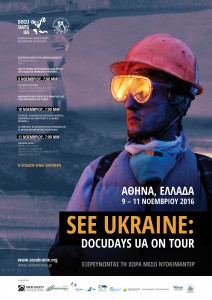 Radical leftists baffle Docudays UA screenings in Athens
On May 13, the project SEE UKRAINE: DOCUDAYS UA ON TOUR started in Athens. On the eve of the opening the managers of the Exile Room, the main festival venue in Greece, refused to host the festival events after radical groups' call for a protest rally near the location. The organizers addressed the Embassy of Ukraine to the Hellenic Republic urgently with a request to host the screenings and discussions in its premises.
In the evening of May 13, while the film "Euromaidan. Rough Cut" was being screened at the opening of the festival, the rally of pro-Russian forces, who called themselves "Greek anti-fascists", gathered next to the Exile Room. After the meeting, a group of young people headed towards the gallery which would have to host the Ukrainian photographer Oleksandr Hliadelov's exhibition "Hey, brother?". They threatened the gallery owners and accused them of supporting the Ukrainian nazis.
It is reported that the local radical sources spread false information about the project "See Ukraine", distort the facts and accuse the organizers of the attempts to slander the residents of Crimea and Donbas, although the program contains no films on a similar topical.
"Through the example of cultural diplomacy initiative of the Docudays UA we have seen how the information campaign against Ukraine is being waged and how it is important not to succumb to provocations and not to believe that the Greeks are hostile to Ukrainians. They are not. Pro-Russian forces deliberately create this myth, trying to quarrel two countries with each other. This is why we held the first part of the festival in Greece despite the difficulties," said Olha Birzul, the PR-coordinator of the project "See Ukraine: Docudays UA on Tour."
During three days, the viewers in Athens had the opportunity to watch short films of Ukrainian filmmakers: "Doctor comes last" by Svitlana Shymko and "Sirs and signors" by Oleksandr Techynsky. Moreover, the discussion "Where is Ukraine heading after Euromaidan" was held, involving Ukrainian-Greek experts: philosopher Volodymyr Yermolenko, journalist Tetyana Oharkova, Greek professor of geostrategy Nikos Liheros and historian Michalis Varlasa.
"First of all, we were impressed by how much the audience was interested in the discussion. The people had a lot of questions concerning the state of affairs in Ukraine, fighting against corruption, power of the Ukrainian civil society, as well as Russian aggression, causes of the annexation of Crimea and the future of the Donbas, - says Tetyana Ogarkova (Ukraine Crisis Media Center, Hromadske TV). – Also, we talked about difficultues in explaining the pro-European choice of Ukraine in Greece, a country with a strong Eurosceptic background."
"We should continue to do everything possible to convey information about Ukraine to the international audience. It is important to speak of the power of Ukrainian society, the rise of a new Ukraine, and the nature of Russian aggression that threatens the entire world order," said Volodymyr Yermolenko, the member of the NGO "Internews-Ukraine."
The festival team truly appreciates the assitance of the Association of the Ukrainian Diaspora in Greece "Ukrainian - Hellenic Thought" in organizing the film screenings of SEE UKRAINE: DOCUDAYS UA ON TOUR, as well as the Ukrainian Embassy which agreed to host the events.
For the time being the team of SEE UKRAINE has suspended the second part of the project, scheduled for May, 26-28, with the aim of finding more secure venues.
Radical leftists baffle Docudays UA screenings in Athens
On May 13, the project SEE UKRAINE: DOCUDAYS UA ON TOUR started in Athens. On the eve of the opening the managers of the Exile Room, the main festival venue in Greece, refused to host the festival events after radical groups' call for a protest rally near the location. The organizers addressed the Embassy of Ukraine to the Hellenic Republic urgently with a request to host the screenings and discussions in its premises.
In the evening of May 13, while the film "Euromaidan. Rough Cut" was being screened at the opening of the festival, the rally of pro-Russian forces, who called themselves "Greek anti-fascists", gathered next to the Exile Room. After the meeting, a group of young people headed towards the gallery which would have to host the Ukrainian photographer Oleksandr Hliadelov's exhibition "Hey, brother?". They threatened the gallery owners and accused them of supporting the Ukrainian nazis.
It is reported that the local radical sources spread false information about the project "See Ukraine", distort the facts and accuse the organizers of the attempts to slander the residents of Crimea and Donbas, although the program contains no films on a similar topical.
"Through the example of cultural diplomacy initiative of the Docudays UA we have seen how the information campaign against Ukraine is being waged and how it is important not to succumb to provocations and not to believe that the Greeks are hostile to Ukrainians. They are not. Pro-Russian forces deliberately create this myth, trying to quarrel two countries with each other. This is why we held the first part of the festival in Greece despite the difficulties," said Olha Birzul, the PR-coordinator of the project "See Ukraine: Docudays UA on Tour."
During three days, the viewers in Athens had the opportunity to watch short films of Ukrainian filmmakers: "Doctor comes last" by Svitlana Shymko and "Sirs and signors" by Oleksandr Techynsky. Moreover, the discussion "Where is Ukraine heading after Euromaidan" was held, involving Ukrainian-Greek experts: philosopher Volodymyr Yermolenko, journalist Tetyana Oharkova, Greek professor of geostrategy Nikos Liheros and historian Michalis Varlasa.
"First of all, we were impressed by how much the audience was interested in the discussion. The people had a lot of questions concerning the state of affairs in Ukraine, fighting against corruption, power of the Ukrainian civil society, as well as Russian aggression, causes of the annexation of Crimea and the future of the Donbas, - says Tetyana Ogarkova (Ukraine Crisis Media Center, Hromadske TV). – Also, we talked about difficultues in explaining the pro-European choice of Ukraine in Greece, a country with a strong Eurosceptic background."
"We should continue to do everything possible to convey information about Ukraine to the international audience. It is important to speak of the power of Ukrainian society, the rise of a new Ukraine, and the nature of Russian aggression that threatens the entire world order," said Volodymyr Yermolenko, the member of the NGO "Internews-Ukraine."
The festival team truly appreciates the assitance of the Association of the Ukrainian Diaspora in Greece "Ukrainian - Hellenic Thought" in organizing the film screenings of SEE UKRAINE: DOCUDAYS UA ON TOUR, as well as the Ukrainian Embassy which agreed to host the events.
For the time being the team of SEE UKRAINE has suspended the second part of the project, scheduled for May, 26-28, with the aim of finding more secure venues.
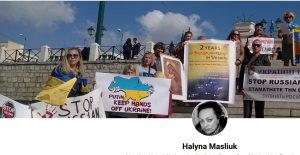
Radical leftists baffle Docudays UA screenings in Athens
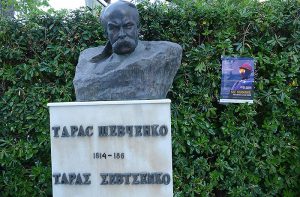 On May 13, the project SEE UKRAINE: DOCUDAYS UA ON TOUR started in Athens. On the eve of the opening the managers of the Exile Room, the main festival venue in Greece, refused to host the festival events after radical groups’ call for a protest rally near the location. The organizers addressed the Embassy of Ukraine to the Hellenic Republic urgently with a request to host the screenings and discussions in its premises.
In the evening of May 13, while the film “Euromaidan. Rough Cut” was being screened at the opening of the festival, the rally of pro-Russian forces, who called themselves “Greek anti-fascists”, gathered next to the Exile Room. After the meeting, a group of young people headed towards the gallery which would have to host the Ukrainian photographer Oleksandr Hliadelov’s exhibition “Hey, brother?”. They threatened the gallery owners and accused them of supporting the Ukrainian nazis.
On May 13, the project SEE UKRAINE: DOCUDAYS UA ON TOUR started in Athens. On the eve of the opening the managers of the Exile Room, the main festival venue in Greece, refused to host the festival events after radical groups’ call for a protest rally near the location. The organizers addressed the Embassy of Ukraine to the Hellenic Republic urgently with a request to host the screenings and discussions in its premises.
In the evening of May 13, while the film “Euromaidan. Rough Cut” was being screened at the opening of the festival, the rally of pro-Russian forces, who called themselves “Greek anti-fascists”, gathered next to the Exile Room. After the meeting, a group of young people headed towards the gallery which would have to host the Ukrainian photographer Oleksandr Hliadelov’s exhibition “Hey, brother?”. They threatened the gallery owners and accused them of supporting the Ukrainian nazis.
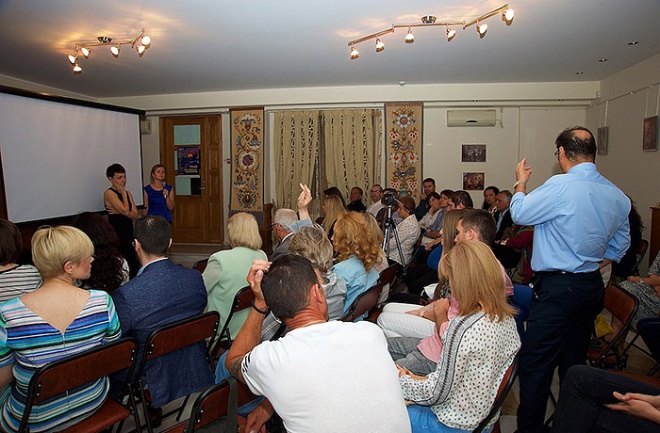 It is reported that the local radical sources spread false information about the project "See Ukraine", distort the facts and accuse the organizers of the attempts to slander the residents of Crimea and Donbas, although the program contains no films on a similar topical.
"Through the example of cultural diplomacy initiative of the Docudays UA we have seen how the information campaign against Ukraine is being waged and how it is important not to succumb to provocations and not to believe that the Greeks are hostile to Ukrainians. They are not. Pro-Russian forces deliberately create this myth, trying to quarrel two countries with each other. This is why we held the first part of the festival in Greece despite the difficulties," said Olha Birzul, the PR-coordinator of the project “See Ukraine: Docudays UA on Tour.”
It is reported that the local radical sources spread false information about the project "See Ukraine", distort the facts and accuse the organizers of the attempts to slander the residents of Crimea and Donbas, although the program contains no films on a similar topical.
"Through the example of cultural diplomacy initiative of the Docudays UA we have seen how the information campaign against Ukraine is being waged and how it is important not to succumb to provocations and not to believe that the Greeks are hostile to Ukrainians. They are not. Pro-Russian forces deliberately create this myth, trying to quarrel two countries with each other. This is why we held the first part of the festival in Greece despite the difficulties," said Olha Birzul, the PR-coordinator of the project “See Ukraine: Docudays UA on Tour.”
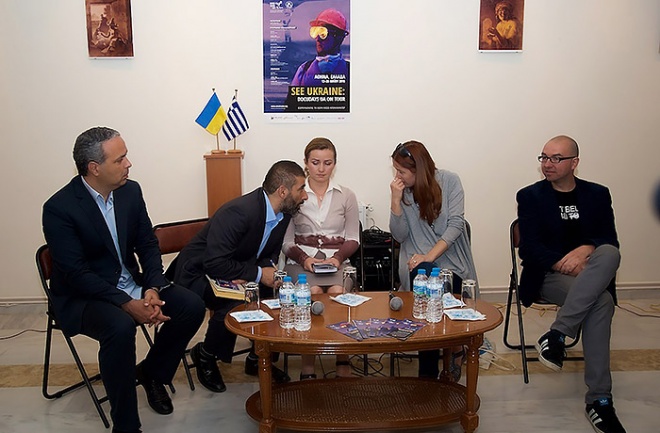 During three days, the viewers in Athens had the opportunity to watch short films of Ukrainian filmmakers: "Doctor comes last" by Svitlana Shymko and "Sirs and signors” by Oleksandr Techynsky. Moreover, the discussion "Where is Ukraine heading after Euromaidan" was held, involving Ukrainian-Greek experts: philosopher Volodymyr Yermolenko, journalist Tetyana Oharkova, Greek professor of geostrategy Nikos Liheros and historian Michalis Varlasa.
“First of all, we were impressed by how much the audience was interested in the discussion. The people had a lot of questions concerning the state of affairs in Ukraine, fighting against corruption, power of the Ukrainian civil society, as well as Russian aggression, causes of the annexation of Crimea and the future of the Donbas, - says Tetyana Ogarkova (Ukraine Crisis Media Center, Hromadske TV). – Also, we talked about difficultues in explaining the pro-European choice of Ukraine in Greece, a country with a strong Eurosceptic background.”
"We should continue to do everything possible to convey information about Ukraine to the international audience. It is important to speak of the power of Ukrainian society, the rise of a new Ukraine, and the nature of Russian aggression that threatens the entire world order," said Volodymyr Yermolenko, the member of the NGO "Internews-Ukraine."
During three days, the viewers in Athens had the opportunity to watch short films of Ukrainian filmmakers: "Doctor comes last" by Svitlana Shymko and "Sirs and signors” by Oleksandr Techynsky. Moreover, the discussion "Where is Ukraine heading after Euromaidan" was held, involving Ukrainian-Greek experts: philosopher Volodymyr Yermolenko, journalist Tetyana Oharkova, Greek professor of geostrategy Nikos Liheros and historian Michalis Varlasa.
“First of all, we were impressed by how much the audience was interested in the discussion. The people had a lot of questions concerning the state of affairs in Ukraine, fighting against corruption, power of the Ukrainian civil society, as well as Russian aggression, causes of the annexation of Crimea and the future of the Donbas, - says Tetyana Ogarkova (Ukraine Crisis Media Center, Hromadske TV). – Also, we talked about difficultues in explaining the pro-European choice of Ukraine in Greece, a country with a strong Eurosceptic background.”
"We should continue to do everything possible to convey information about Ukraine to the international audience. It is important to speak of the power of Ukrainian society, the rise of a new Ukraine, and the nature of Russian aggression that threatens the entire world order," said Volodymyr Yermolenko, the member of the NGO "Internews-Ukraine."
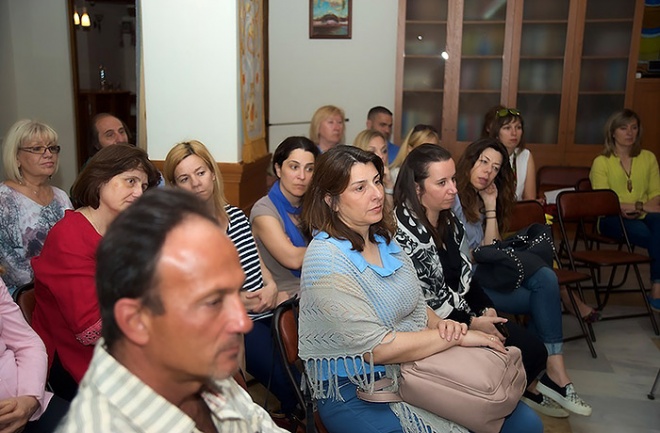 The festival team truly appreciates the assitance of the Association of the Ukrainian Diaspora in Greece “Ukrainian - Hellenic Thought” in organizing the film screenings of SEE UKRAINE: DOCUDAYS UA ON TOUR, as well as the Ukrainian Embassy which agreed to host the events.
For the time being the team of SEE UKRAINE has suspended the second part of the project, scheduled for May, 26-28, with the aim of finding more secure venues.
http://docudays.org.ua/eng/2016/news/kino/see-ukraine-greece/
The festival team truly appreciates the assitance of the Association of the Ukrainian Diaspora in Greece “Ukrainian - Hellenic Thought” in organizing the film screenings of SEE UKRAINE: DOCUDAYS UA ON TOUR, as well as the Ukrainian Embassy which agreed to host the events.
For the time being the team of SEE UKRAINE has suspended the second part of the project, scheduled for May, 26-28, with the aim of finding more secure venues.
http://docudays.org.ua/eng/2016/news/kino/see-ukraine-greece/Ліворадикальні угрупування в Афінах перешкоджають показам Docudays UA

 Показ «Побачити Україну: Docudays UA мандрує світом» у Посольстві України в Греції
Наразі місцеві радикальні джерела поширюють про проект «Побачити Україну» неправдиву інфомацію, перекручують факти і звинувачують у намаганні оббрехати жителів Криму і Донбасу. Хоча у програмі показів немає жодного фільму на подібну тему.
«На прикладі ініціативи Docudays UA з культурної дипломатії ми побачили, як ведеться інформаційна кампанія проти України і як важливо не піддаватися на провокації і не вірити, що греки ворожо ставляться до українців. Це не так. Проросійські сили зумисне створюють цей міф, намагаючись пересварити між собою два народи. Саме тому, незважаючи на труднощі ми провели першу частину фестивалю у Греції», - пояснює Ольга Бірзул, pr-менеджерка «Побачити Україну: Docudays UA мандрує світом».
Показ «Побачити Україну: Docudays UA мандрує світом» у Посольстві України в Греції
Наразі місцеві радикальні джерела поширюють про проект «Побачити Україну» неправдиву інфомацію, перекручують факти і звинувачують у намаганні оббрехати жителів Криму і Донбасу. Хоча у програмі показів немає жодного фільму на подібну тему.
«На прикладі ініціативи Docudays UA з культурної дипломатії ми побачили, як ведеться інформаційна кампанія проти України і як важливо не піддаватися на провокації і не вірити, що греки ворожо ставляться до українців. Це не так. Проросійські сили зумисне створюють цей міф, намагаючись пересварити між собою два народи. Саме тому, незважаючи на труднощі ми провели першу частину фестивалю у Греції», - пояснює Ольга Бірзул, pr-менеджерка «Побачити Україну: Docudays UA мандрує світом».
 Дискусія «Куди прямує Україна після Євромайдану» у Посольстві України в Греції
Протягом трьох днів глядачі в Афінах мали змогу подивитися фільми «Евромайдан. Чорновий монтаж», короткометражні фільми українських режисерів: «Медик іде останньою» Світлани Шимко та «Сери та сеньйори» Олександра Течинського. Крім того, відбулася дискусія «Куди прямує Україна після Євромайдану» за участі українсько-грецьких експертів: філософа Володимира Єрмоленка, журналістки Тетяни Огаркової, грецького професора з геостратегії Нікоса Лігероса та історика Міхаліса Варласа.
«Дискусія вразила, перш за все, зацікавленістю аудиторії. У людей було багато питань щодо стану справ в Україні, боротьби з корупцією, сили українського суспільства, а також російської агресії, причин анексії Криму та майбутнього Донбасу, - говорить Тетяна Огаркова (Український кризовий медіа центр, Громадське ТБ). - Ми говорили також про складнощі пояснення європейського вибору України в Греції - країні з потужними євроскептичними настроями».
«Нам треба продовжувати робити все можливе для донесення інформації про Україну міжнародній аудиторії. Важливо говорити як про силу українського суспільства, про постання нової України, - так і про природу російської агресії, яка загрожує усьому світовому порядку», - наголошує Володимир Єрмоленко (Інтерньюз-Україна, Громадське ТБ).
Дискусія «Куди прямує Україна після Євромайдану» у Посольстві України в Греції
Протягом трьох днів глядачі в Афінах мали змогу подивитися фільми «Евромайдан. Чорновий монтаж», короткометражні фільми українських режисерів: «Медик іде останньою» Світлани Шимко та «Сери та сеньйори» Олександра Течинського. Крім того, відбулася дискусія «Куди прямує Україна після Євромайдану» за участі українсько-грецьких експертів: філософа Володимира Єрмоленка, журналістки Тетяни Огаркової, грецького професора з геостратегії Нікоса Лігероса та історика Міхаліса Варласа.
«Дискусія вразила, перш за все, зацікавленістю аудиторії. У людей було багато питань щодо стану справ в Україні, боротьби з корупцією, сили українського суспільства, а також російської агресії, причин анексії Криму та майбутнього Донбасу, - говорить Тетяна Огаркова (Український кризовий медіа центр, Громадське ТБ). - Ми говорили також про складнощі пояснення європейського вибору України в Греції - країні з потужними євроскептичними настроями».
«Нам треба продовжувати робити все можливе для донесення інформації про Україну міжнародній аудиторії. Важливо говорити як про силу українського суспільства, про постання нової України, - так і про природу російської агресії, яка загрожує усьому світовому порядку», - наголошує Володимир Єрмоленко (Інтерньюз-Україна, Громадське ТБ).
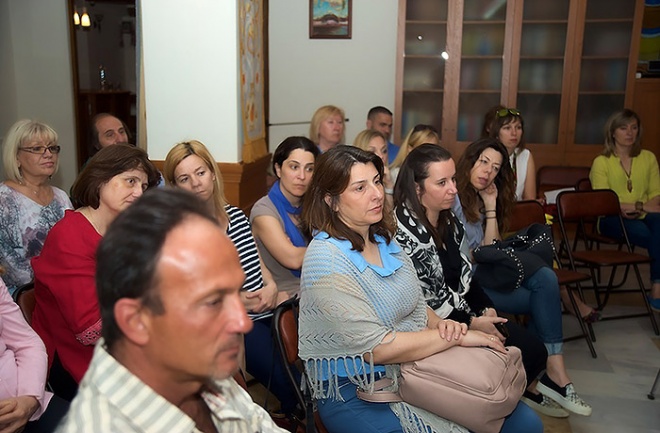 Показ «Побачити Україну: Docudays UA мандрує світом» у Посольстві України в Греції
Команда фестивалю щиро вдячна за допомогу Асоціації української діаспори «Українсько-грецька думка» в організації показів «Побачити Україну: Docudays UA мандрує світом», а також Посольству України, яке надало місце для проведення подій. Наразі команда «Побачити Україну» призупиняє другу частину проекту, заплановану на 26-28 травня, з метою пошуку безпечних локацій.
Стежте за новинами проекту на сайті www.seeukraine.org
Фото: Джон Карадiмас та Ольга Бірзул
Показ «Побачити Україну: Docudays UA мандрує світом» у Посольстві України в Греції
Команда фестивалю щиро вдячна за допомогу Асоціації української діаспори «Українсько-грецька думка» в організації показів «Побачити Україну: Docudays UA мандрує світом», а також Посольству України, яке надало місце для проведення подій. Наразі команда «Побачити Україну» призупиняє другу частину проекту, заплановану на 26-28 травня, з метою пошуку безпечних локацій.
Стежте за новинами проекту на сайті www.seeukraine.org
Фото: Джон Карадiмас та Ольга Бірзул
Docudays UA вирушає у турне до Греції
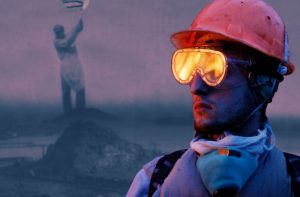
13-28 травня в Афінах триватиме міжнародне турне «ПОБАЧИТИ УКРАЇНУ: DOCUDAYS UA МАНДРУЄ СВІТОМ». Події фестивалю проходитимуть у приміщеннях арт-простору Exile Room та галереї BOOart Café Bar.
Проект SEE UKRAINE: DOCUDAYS UA ON TOUR – це акція у галузі культурної дипломатії, що реалізується Міжнародним фестивалем документального кіно про права людини Docudays UA. У програмі фестивалю заплановані покази документальних фільмів, фотовиставки, зустрічі з українськими кінематографістами, а також дискусії за участю громадських активістів і правозахисників, які допоможуть краще зрозуміти ситуації, зображені у фільмах, та нададуть більше інформації про події у країні.
У січні проект SEE UKRAINE: DOCUDAYS UA ON TOUR вже відвідав Францію і до кінця 2016 року поїде до Німеччини, Італії та Іспанії.
У Греції SEE UKRAINE: DOCUDAYS UA ON TOUR триватиме два тижні. Партнером фестивалю виступила Асоціація української діаспори в Греції та філоукраїнців греків «Українсько-Грецька Думка». Шість українських неігрових стрічок за часом створення охоплюють майже століття й дозволяють побачити країну з різних ракурсів і культурно-історичних перспектив. Зокрема, це два призери міжнародних кінофестивалів, які в останні роки відкривали світові українську документалістику: мистецький фільм про життя вівчарів українських Карпат «Жива ватра» (2014) Остапа Костюка та альманах «Євромайдан. Чорновий монтаж» (2014), який відображає три місяці революції і був першим фільмом-свідченням вибуху пробудженої гідності українців. Збірка короткометражних документальних фільмів («Сери та сеньйори», «Медик іде останньою», «Місце, що ми звемо домом») – це погляд на сучасну Україну не лише очима місцевих режисерів, а й іноземних. У програмі показів є класика кінематографу – чорно-білий німий фільм «Одинадцятий» (1928) Дзиґи Вертова, в якому йдеться про 1920-ті роки, період будівництва соціалізму в Українській РСР та індустріалізації, часи, коли молоде покоління митців натхненно творило нову міфологію і працювало на радянську пропаганду. Показ стрічки відбудеться у супроводі живої музики у виконанні піаністки Софії Турти та композитора Антона Байбакова, який спеціально створив оригінальний саундтрек для фільму. Під час показів також відбудуться зустрічі та обговорення фільмів із режисерами Світланою Шимко та Остапом Костюком. Крім того, у рамках проекту в Афінах пройде фотовиставка Олександра Глядєлова «Чуєш, брате?», яку відкриє сам автор. Експозиція розповідає про революцію та війну Росії проти України. Фотовиставка була показана на Docudays UA у Києві, а також у регіонах України під час Мандрівного фестивалю. Олександр Глядєлов знімає на чорно-білу плівку, використовуючи аналогову камеру з ручним наведенням фокуса. Знімати таким чином в епіцентрі бою практично неможливо, а тому фотографу доводиться вдивлятися в те, що відбувається в проміжках життя між боями. Важлива складова SEE UKRAINE: DOCUDAYS UA ON TOUR – дискусійна платформа. У Греції відбудуться дві розмови за участі відомих активістів і правозахисників про сучасні події в Україні. Дебати «Куди прямує Україна після Євромайдану» сфокусофані на осмисленні перемог та поразок після української Революції гідності. Євромайдан і війна Росії проти України змусили українців переосмислити своє минуле і майбутнє й усвідомити, яку країну вони хочуть збудувати, і водночас поставили європейців перед вибором: або продовжувати спокійно споглядати, як у світі набирає силу політика ворожнечі, або захищати свої цінності. Яке місце України в європейському проекті і що вона може у нього принести? У дискусії візьмуть участь філософ Володимир Єрмоленко (Україна), журнілістка Тетяна Огаркова (Україна) та професор геостратегії Никос Лігерос (Греція). Модеруватиме розмову грецький історик Міхаліс Варлас.Російська пропаганда, використовуючи оплачуваних нею журналістів, занурює світ у змінену реальність і нав’язує суспільству поблажливе ставлення до анексії Криму та до розв"язаної Росією війни на Донбасі. Але насправді питання стосується не лише України. Це боротьба за глобальне домінування. Як це працює і у чому відмінність між радянською пропагандою та політикою Кремля? У дискусії «Еволюція пропаганди Кремля: від спровокованої війни в Україні до глобального панування» візьмуть участь співзасновник ініціативи StopFake.org Євген Федченко (Україна), журналіст Давід Патрікаракос (Греція) та Тетяна Герасимова (Україна), координатор «Групи 2 травня», яка веде незалежне журналістське розслідування трагічних подій в Одесі 2 травня 2014 року. Модератор – грецька журналістка Іоанна Ілліаді.
«Ми переконані, що документальне кіно, фотографія та живе спілкування – найкращий засіб швидко й ефективно занурити іноземних глядачів у соціально-культурну та політичну реальність нашої країни, донести правду про російську агресію й показати, що Україна – європейська держава свободи, позитивних змін і талановитих людей, які нині мужньо й самовіддано захищають найвищі європейські цінності», – пояснює Алла Тютюнник, директор проекту SEE UKRAINE: DOCUDAYS UA ON TOUR. Асоціація української діаспори в Греції та філоукраїнців греків «Українсько-Грецька Думка» – перше офіційно зареєстроване товариство в Греції, яке утворилося на базі першої і досі єдиної української газети з грецьким додатком «Вісник - Аґеліафорос». Метою асоціації є збереження національної ідентичності, рідної мови, традицій та звичаїв, інформування грецького суспільства про правдиву історію України, сьогодення та самобутність української нації. SEE UKRAINE: DOCUDAYS UA ON TOUR відбувається за підтримки Фундації відкритого суспільства та Міжнародного фонду «Відродження».Представники складових організацій Світового Конґресу Українців обговорили питання про підтримку України з Головою Комітету Верховної Ради України в закордонних справах

